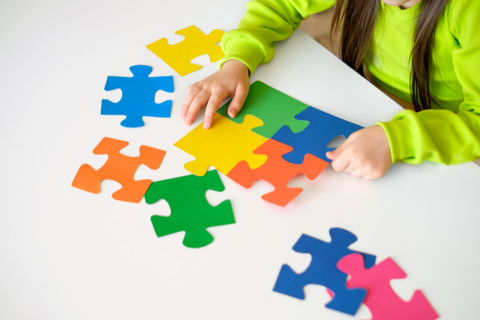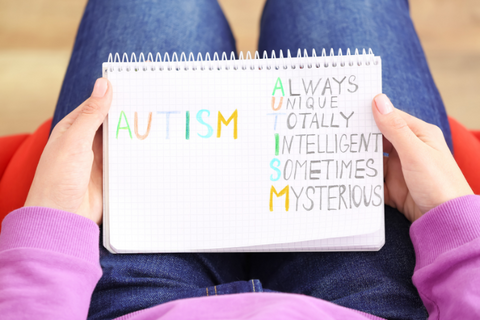Guest post by Kristine Kenny, MSN, RN, CPN, CAS
Autism spectrum disorders includes a wide scope of conditions that involve deficits in social skills, speech, communication and repetitive behaviors. Since it is a spectrum disorder the severity of these conditions are from mild to severe. People with autism sometimes learn, think and problem-solve from highly skilled to severely challenged. These challenges will determine their different supports that they will receive over a lifetime. ASD affects both the parents and siblings. The direct and indirect cost of a person with ASD over a lifetime is substantial.

Autism 101 – What is Autism Spectrum Disorder?
Today, we will focus on the very basics of this complex disorder.
- Occurrence
- Causes
- Signs and symptoms
- Co Morbidities
- Screening
- Diagnosis
- Treatment
Occurrence
According to the CDC, ASD affects an estimated 1 in 36 children in the United States today. It does not discriminate and is reported in all ethnic, racial and socioeconomically groups. It is reported to be more common in boys more than girls.
Causes
Autism Speaks states that there’s no one cause of autism. Research suggests that autism develops from a combination of genetic and non-genetic, or environmental, influences. Researchers is occurring all over the world to try and figure out what is causing this disorder. As scientists are working hard to figure out the cause other research is looking at new treatments and supports that can improve the quality of life of those with ASD.
Signs and Symptoms
Most of the research states that signs and symptoms of ASD appear before 2 or 3 years old. However, Autism Speaks states that the autism diagnosis age and intensity of autism’s early signs vary widely. Studies of infants have showed hints of the disorder in their first months and in others behaviors become obvious as late as age 2 or 3. Either way, a diagnosis can be made as early as 18 months if your child presents with symptoms.
It is crucial to note that research shows that not all children with autism show every sign and symptom of the disorder. It is extremely important to talk with your pediatrician or family doctor right away about any signs that you think your child may be experiencing. The CDC offers a resource called “Learn the Signs, Act Early.” It is free and downloadable. It is an in depth way to track your child’s milestones and know what is expected at each developmental level. Most importantly, it guides you on what to do if your child is not meeting their milestones.
Research states the following key signs and symptoms as alerts at any age to report to your pediatrician.
- Loss of previously acquired speech, babbling or social skills
- Avoidance of eye contact
- Persistent preference for solitude
- Difficulty understanding other people’s feelings
- Delayed language development
- Persistent repetition of words or phrases (echolalia)
- Resistance to minor changes in routine or surroundings
- Restricted interests
- Repetitive behaviors (flapping, rocking, spinning, etc.)
- Unusual and intense reactions to sounds, smells, tastes, textures, lights and/or color

Comorbidities
It is important to note that children with ASD may have other medical conditions that need further evaluation and treatments. Some of the conditions include gastrointestinal disorders, such as feeding issues, abdominal pain, constipation and/or diarrhea. Neurological disorders that include seizures or sleep disorders. And behavioral health problems that include anxiety, depression, aggression or attention related issues.
Screening
The American Academy of Pediatrics (AAP) recommends that all children be screened for autism spectrum disorder at their 18- and 24-month well-child checkups. If you suspect that your child may have autism, discuss it with your pediatrician sooner rather than later. You don’t need to wait. Research does show that the earlier the child with ASD receives early intervention services that improved outcomes are possible for the child with ASD.
If your pediatrician suspects that your child may have ASD, they will refer you to a specialist who is an expert in diagnosing this disorder.
Diagnosis
Diagnosis of autism spectrum disorder is made by a thorough and detailed collection of the child’s history, observation and testing. It is a collaboration of the parents report, the pediatricians input and a specialist who is an expert in the diagnosing of ASD. The AAP states that ASD can also be diagnosed by a team of specialists that might include developmental pediatricians, child neurologists, child psychiatrists, psychologists, speech-language pathologists, occupational or physical therapists, educators and social workers.
Currently, there is not a medical blood test or MRI of the brain test that can diagnosis this disorder. However, sometimes medical tests will be ordered for your child to rule out other types of disorder.
Treatment
Currently, there is no cure for autism. However, there are many treatments that are available that can help reduce the symptoms and assist in improving the life of the person with the disorder.
Keep in mind, your pediatrician can order early intervention services that include such things as speech, occupational and physical evaluations prior to a diagnosis. These services are critical for the foundation of your child’s treatment plan whether the child has a diagnosis of ASD or not. These evaluations can assist in any developmental delays that your child may be experiencing and get you the services that you need sooner rather than later whether your child has ASD or not.
If the child does receive ASD diagnosis, a plethora of treatment options will be prescribed. The foundation of the treatment plan may vary but in most cases will always involve behavioral therapy, speech therapy and occupational therapy. Many other treatments exist that can help your child as well that include music therapy, play therapy and equestrian therapy to name a few. You and your team will decide what is best for your child.
Looking for more information, you’ll enjoy these:
- How to Prepare Your Autistic Child for a Trip to the Doctors
- 5 Early Signs of Autism
- How to Advocate for Your Child with Autism Spectrum Disorder (ASD) in a Medical Setting
- Siblings of Autistic Children: Common Concerns and Effective Strategies
- How to Connect With Parents (Locally and Worldwide) After an Autism Diagnosis

Key Takeaway
Do not wait to consult a professional if you suspect something may not be right about your child. Start the discussion with your pediatrician sooner rather than later. Due to the multiple team members involved in the care of those individuals with ASD, it takes time to get the treatments together and started. Always keep in mind that you know your child the best. Listen to your own intuition. A diagnosis of ASD is a crucial point into a long journey to providing your child with the appropriate treatments for the best outcome.
Kris is a mom of 3, one of whom has autism. She is a pediatric nurse, assistant nursing professor and author. When she has free time, she enjoys exercising, baking and binge watching TV series. Learn more about her at Autism Healthcare Books!
The Nozebot is a battery-powered suction device designed to clear nasal congestion in babies and children.



